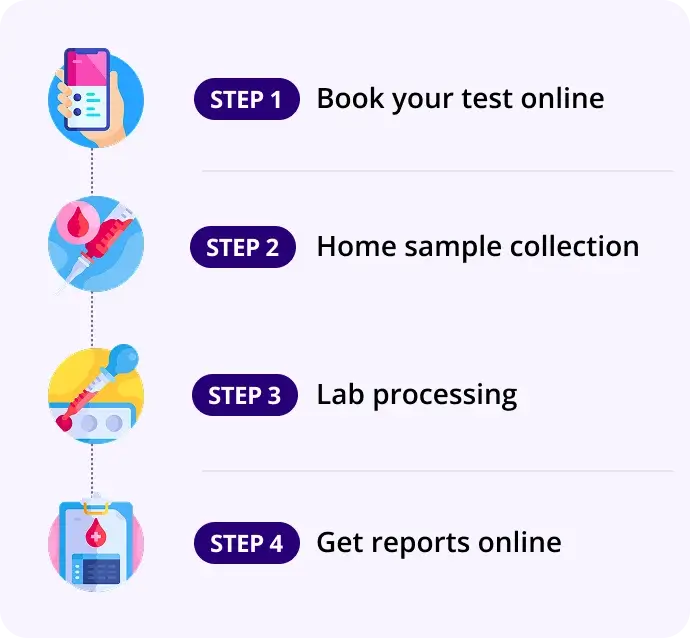Search for
Urea
Kidney
Report in 4Hrs
At Home
No Fasting Required
Details
The blood urea level reflects kidney function and protein metabolism
₹59₹165
64% OFF
FREE:
Ai Insights
Urea Test - Comprehensive Medical Information Guide
- Why is it done?
- Measures the level of urea in the blood, a waste product created when the body breaks down proteins in the liver
- Evaluates kidney function and how effectively the kidneys filter and eliminate nitrogenous waste
- Assesses liver function and protein metabolism
- Ordered as part of routine metabolic screening panels or comprehensive health checks
- Diagnoses and monitors kidney disease, liver disease, and dehydration
- Performed during initial medical evaluations, when symptoms suggest organ dysfunction, or to monitor chronic conditions
- Normal Range
- Standard Reference Ranges:
- Adults: 2.5 to 7.1 mmol/L (7 to 20 mg/dL) or 2.0 to 6.4 mmol/L depending on laboratory standards
- Children: 1.8 to 6.4 mmol/L (5 to 18 mg/dL) - typically lower than adults
- Pregnant women: May be slightly lower (1.4 to 4.3 mmol/L) due to increased plasma volume
- Units of Measurement:
- mmol/L (millimoles per liter) - used in most countries outside North America
- mg/dL (milligrams per deciliter) - used primarily in North America
- Interpretation:
- Normal (within reference range): Indicates healthy kidney and liver function with appropriate protein metabolism
- Elevated (high): Suggests impaired kidney function, dehydration, or liver disease requiring further investigation
- Low (decreased): May indicate liver dysfunction, malnutrition, or certain genetic disorders affecting urea production
- Interpretation
- Elevated Urea Levels (>7.1 mmol/L or >20 mg/dL):
- Kidney dysfunction or chronic kidney disease affecting waste filtration
- Dehydration reducing kidney perfusion and urea excretion
- High protein diet or increased protein catabolism (catabolic states)
- Urinary tract obstruction preventing urea elimination
- Gastrointestinal bleeding increasing blood urea nitrogen (BUN)
- Low Urea Levels (<2.5 mmol/L or <7 mg/dL):
- Severe liver disease or cirrhosis impairing urea production
- Malnutrition or low protein diet reducing substrate for urea synthesis
- Pregnancy due to increased plasma volume dilution effect
- Urea cycle disorders or genetic metabolic disorders affecting ammonia metabolism
- Severe sepsis or systemic inflammatory response syndrome
- Factors Affecting Results:
- Hydration status: Dehydration elevates levels; overhydration decreases levels
- Protein intake: Higher protein diet increases urea production
- Age: Levels may naturally increase with age; newborns have different reference ranges
- Medications: Certain drugs may affect kidney function and urea clearance
- Time of day: Minor diurnal variations may occur
- Clinical Significance:
- The BUN/Creatinine ratio (urea level compared to creatinine) helps differentiate between kidney and non-kidney causes of abnormalities
- Rapid changes in urea levels are more clinically significant than gradual changes
- Persistent elevation warrants investigation for underlying kidney or liver disease
- Associated Organs
- Primary Organ Systems:
- Kidneys: Primary organs responsible for filtering and excreting urea; most important for normal urea levels
- Liver: Site of urea synthesis from ammonia during protein metabolism; essential for urea production
- Conditions Associated with Abnormal Results:
- Kidney-Related:
- Acute kidney injury (AKI) - sudden loss of kidney function
- Chronic kidney disease (CKD) - progressive kidney damage
- Glomerulonephritis - inflammation of kidney filtering units
- Diabetic nephropathy - kidney damage from diabetes
- Hypertensive kidney disease - kidney damage from high blood pressure
- Urinary tract obstruction - blockage preventing urine flow
- Liver-Related:
- Hepatic cirrhosis - severe liver scarring and dysfunction
- Acute liver failure - sudden complete loss of liver function
- Hepatitis - inflammation of liver tissue
- Other Systemic Conditions:
- Dehydration and hypovolemia - reduced blood volume
- Sepsis and infection - systemic inflammatory response
- Gastrointestinal bleeding - increases protein catabolism
- Malnutrition - inadequate protein intake
- Urea cycle disorders - genetic metabolic diseases
- Heart failure - reduced renal perfusion
- Potential Complications of Abnormal Results:
- Uremic syndrome - accumulation of toxic waste products causing systemic symptoms
- Hyperammonemia - elevated ammonia levels in severe liver disease
- Encephalopathy - brain dysfunction from metabolic waste accumulation
- End-stage renal disease - may require dialysis or transplantation
- Follow-up Tests
- Recommended Tests Based on Elevated Urea:
- Serum Creatinine - measures kidney function; elevated levels confirm kidney dysfunction
- Glomerular Filtration Rate (GFR) - estimates how well kidneys filter waste
- Electrolytes Panel - assesses sodium, potassium, chloride, and bicarbonate levels
- Liver Function Tests (LFTs) - evaluates liver health including ALT, AST, bilirubin, albumin
- Urinalysis - detects protein, blood, and other abnormalities indicating kidney disease
- 24-Hour Urine Protein - quantifies protein loss in urine indicating kidney damage
- Recommended Tests Based on Low Urea:
- Complete Metabolic Panel - comprehensive assessment of kidney, liver, and nutritional status
- Serum Albumin - assesses protein malnutrition
- Total Protein - evaluates overall protein status
- Ammonia Level - assesses ammonia metabolism in liver disease
- Prothrombin Time (PT/INR) - evaluates liver synthetic function
- Imaging Studies:
- Renal Ultrasound - visualizes kidney structure and detects abnormalities
- Abdominal CT or MRI - assesses kidney and urinary tract disease
- Liver Ultrasound or MRI - evaluates liver structure and fibrosis
- Specialist Consultations:
- Nephrology consultation - for persistent kidney dysfunction
- Hepatology consultation - for abnormal liver function or low urea
- Monitoring Frequency:
- Acute conditions: May require daily monitoring until stable
- Chronic kidney disease: Typically monitored every 3-6 months
- Post-treatment: Follow-up testing at 2-4 weeks to assess response to therapy
- Preventive screening: Annually for at-risk patients (diabetes, hypertension)
- Fasting Required?
- Fasting Requirement: NO
- Fasting is not required for this test - blood can be drawn at any time of day
- Food and drink do not directly affect urea measurement results
- Patient Preparation Instructions:
- Maintain normal fluid intake - ensure adequate hydration (avoid dehydration which can falsely elevate levels)
- Continue regular diet - high protein intake may slightly increase levels but should be noted by healthcare provider
- Avoid strenuous exercise for 24 hours before test if possible - intense exercise may temporarily elevate urea
- Inform healthcare provider of all medications - some drugs may affect kidney function and urea metabolism
- Medications That May Affect Results:
- ACE inhibitors and ARBs - may reduce urea levels by improving kidney perfusion
- Diuretics - may increase urea if causing dehydration
- NSAIDs - can impair kidney function and raise urea levels
- Corticosteroids - may increase protein catabolism and urea levels
- Antibiotics - certain types may affect kidney function
- Continue all prescribed medications unless specifically instructed otherwise by physician
- General Test Administration:
- Blood sample collection via venipuncture (needle puncture of vein)
- Typical collection takes 1-2 minutes
- Minimal discomfort with small needle stick sensation
- Results typically available within 24-48 hours depending on laboratory
- Can be performed on outpatient basis without restrictions afterward
How our test process works!

